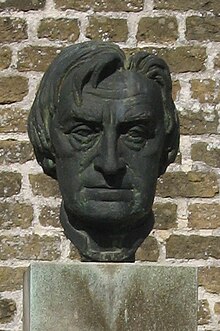Cyriel Verschaeve
Cyriel Charles Marie Joseph Verschaeve (born April 30, 1874 in Ardooie , † November 8, 1949 in Solbad Hall ) was a Belgian priest , Flemish nationalist and author. In the latter activity he appeared as a poet, essayist and dramaturge. He was sentenced to death in absentia for collaborating with the German occupiers during the Second World War and spent the last years of his life in exile in Austria after an episode in Germany .
Life
Verschaeve studied at the Minor Seminary in Roeselare and the Major Seminary in Bruges , where he was ordained a priest in 1897. In the period that followed, he attended colleges at the University of Jena (including with Rudolf Eucken ) and the University of Marburg . From 1896 to 1911 he worked as a school teacher in Tielt , then as a chaplain in Alveringem until he retired in 1939.
After he had confessed to the Flemish Movement during his student days , Verschaeve took a decisive party for the Boers during the Second Boer War and developed into one of the central figures in the Catholic Flemish movement by 1914.
Since Alveringem in West Flanders was in the immediate vicinity of the front during the First World War , its chaplaincy soon developed into a meeting place for young Flemish soldiers . He became the spiritual leader of the front movement, which opposed the predominant role of the French language in the Belgian military and soon made further demands for a reform of the Belgian state .
After the war, Verschaeve supported the Flemish nationalist front party and increasingly turned to open rejection of the Belgian state. From the mid- 1920s he increasingly rejected parliamentarism and supported the fascist Verdinaso in 1931 , until this party announced a new direction in 1934 and now committed itself to the Belgian state. The early 1930s , he visited Germany several times and came under the influence of Robert Paul Oszwald the Nazis .
The invasion of Germany in Belgium in 1940 saw Verschaeve as an opportunity to achieve self-government of Flanders and for this was also willing to cooperate with the occupation, provided that the existence of Flanders would not be touched. He became chairman of the Flemish Cultural Council and supported the war against the Soviet Union as an anti-communist crusade. After him in 1936 along with the late de Clercq René and Stijn Streuvels the Rembrandt Award of the Hanseatic University had been awarded, received Verschaeve 1944 honorary doctorate from the University of Jena. and Cologne . During those years he also wrote for the Brussels newspaper for the occupation organization .
After the liberation of Belgium by the Allies , Verschaeve first fled to Germany, where he advised the Flemish government headed by Jef Van de Wiele in a committee . This had formed from other collaborators who had fled and now claimed, with German support, to be a government in exile. Because of the subsequent collapse of the Third Reich, Verschaeve moved to Tyrol. He was sentenced to death in absentia in December 1946 and died three years later in exile. His remains were secretly exhumed in 1973 by the nationalist Vlaamse Militanten Orde and transferred to Alveringem.
Verschaeve cultivated a baroque and pathetic style in his literary work, which is characterized by drama and metaphysical unrest and did not shy away from monumental heroic figures in his theatrical works. He mainly worked on religious and historical topics. In his essays, Verschaeve wrote about men of letters, painters, composers, thinkers and mystics. During the time of National Socialism , many of his works were published in German translation, outside of this era this remained the exception.
Web links
- Catalog of works and biographies at the Digitale Bibliotheek voor de Nederlandse Letteren (Dutch)
- Literature by and about Cyriel Verschaeve in the catalog of the German National Library
Individual evidence
- ^ Romain Vanlandschoot: Cyriel Verschaeve . In: Reginald de Schrijver et al. (Ed.): Nieuwe Encyclopedie van de Vlaamse Bewegungsing . Lanoo, Tielt 1998, ISBN 90-209-3042-7 , pp. 3277-3283.
- ↑ This honorary doctorate was revoked again in 1946 by a senate resolution of the University of Jena .
- ^ Rolf Falter: De Bruxelles Zeitung (1940–1944) in: Historica Lovaniensia 137, Catholic University of Leuven (Institute for History), Leuven 1982, p. 69.
- ↑ Bruno de Wever: Greep naar de makes. Vlaams-nationalisme en Nieuwe Orde. Het VNV 1933-1945. Lannoo, Tielt 1994, ISBN 90-209-2267-X , p. 618. At the same time dissertation Gent 1992.
| personal data | |
|---|---|
| SURNAME | Verschaeve, Cyriel |
| ALTERNATIVE NAMES | Verschaeve, Cyriel Charles Marie Joseph |
| BRIEF DESCRIPTION | Belgian priest, nationalist and author |
| DATE OF BIRTH | April 30, 1874 |
| PLACE OF BIRTH | Ardooie |
| DATE OF DEATH | November 8, 1949 |
| Place of death | Hall in Tirol |
